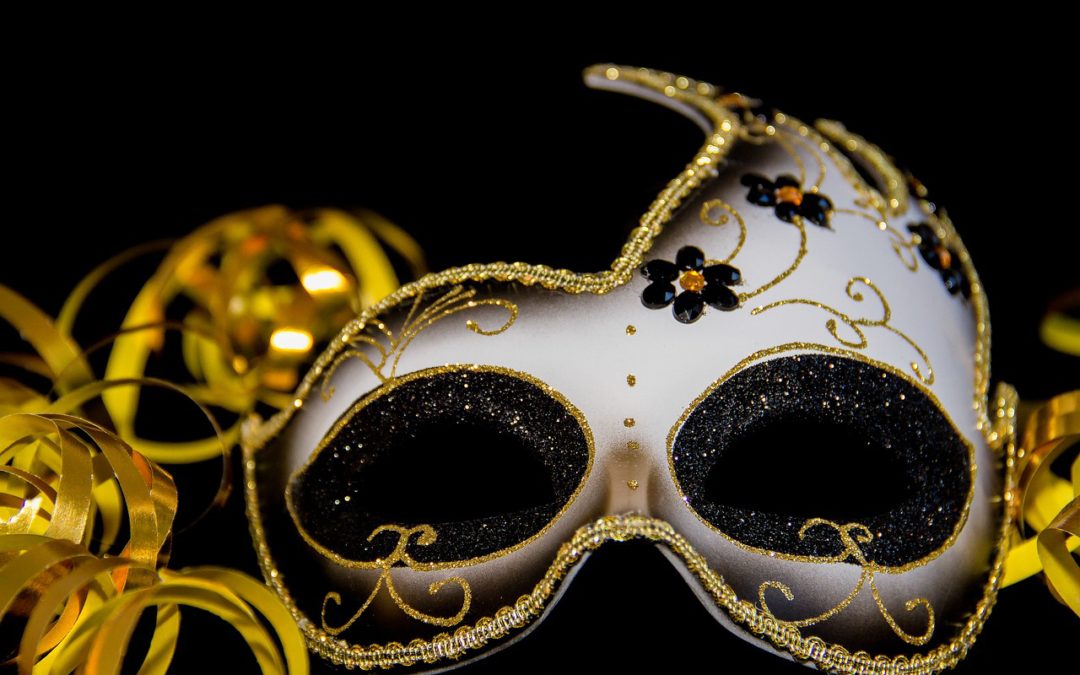Have you ever tried to be someone you are not? It’s exhausting. It feels forced. And yet, from time to time we all hide parts of our real selves. You might wear a confident smile at a job interview to disguise the nerves you are feeling. In college, I “passed” as an extrovert to keep up with an around-the-clock social life.
When it comes to being authentic, we’re often selective about what we share. If you live with depression, you’re probably not going to show your struggles around someone who dismisses you and tells you to “just get over it.” Most of us tend to reveal what we think our environment will receive, and hide what might be rejected or threatened.
When we don’t feel safe, we can’t be real.
It’s human nature to adapt self-expression to our situations. If you have been in unhealthy or abusive environments, this need may have been more extreme. You may have had to modify your behavior significantly in order to keep yourself safe. Masks are one such survival strategy. We cover ourselves when it’s not safe for us to express ourselves.
Being a “good girl” was a mask I used to put on when I was in abusive environments. Growing up, I saw that when people were happy, they were generally nicer to me. So I became what they wanted: a sweet, obedient girl who never rocked the boat. It helped me feel secure and in control. As time went on, the mask thickened. I learned to submit to other people and merge with their beliefs. I would do whatever it took to make other people happy. At times, that meant giving in to others and allowing them to hurt me.
As survivors, we cling tightly to our masks, because they protected us. We may not know who we are without them. When I was locked inside the identity of being “good,” I lost touch with my true feelings, beliefs and experiences. The real me inside was angry, because she didn’t have a voice.
We discover who we are when we are safe.
Becoming authentic is a journey. It begins when you find someone who simply wants to connect with you – a person who cares without needing to change or control you.
Safe people create a sacred space. It’s more than the absence of harm – it’s an active receiving of another person. A soft place to land, they are the ones who will support you during your good days, bad days and everything in-between.
My masks gradually started to peel away when safe people came into my life. I could trust them with my innermost thoughts and feelings, and being present in those intimate conversations, I found an opening. My real self started to flow through, giving me the chance to discover who I am.
After holding ourselves together out in the world, we can sigh with relief around a safe person, take off our masks and just be ourselves. The authentic self inside us, so often hidden, can come out and be seen. By receiving us, safe people give our buried parts a reason to come alive.
As we walk on our journey toward authenticity, safe people nurture our souls and often are the catalysts for our self-discovery and growth.
You deserve to be safe.
It can be hard to trust that there are safe people out there after being abused. If you haven’t been around any safe people, how would you know how to recognize them?
They are out there. My hope is that we all will find safe people, and that we will be them.
These are some qualities that I look for in safe people.
- Safe people are honest. Their words match their actions. They are real about their flaws and struggles, and because of that, they are naturally accepting of yours. They don’t try to manipulate you with guilt, fear or shame. They are down to earth; you don’t see much pretense from them, if at all. They show more than one side of themselves, not just the sides that make them look good.
- Safe people seek to understand you. They are attentive and take time to learn about you. They don’t have a habit of judging. They are curious and interested in seeing you as a whole person, past your struggles. They relate to you. If you have shared that you have been through abuse, they believe you and actively support you.
- Safe people treat you like an equal. There is no pedestal in your relationship – they neither put you beneath them nor above them. They respect you. They don’t use you for support, money or anything else. They give as much as they take.
- Safe people want you to be free. They encourage you to be a separate person, with your own interests, beliefs and friendships. They honor your boundaries as well as their own. They give without expecting something in return. They don’t try to force you or pressure you to do something that you don’t want to do. They don’t try to isolate you, and they aren’t possessive.
- Safe people positively impact your mental health. They make you feel lighter, more peaceful, more inspired. They bring out the best in you. They don’t consistently drain you, bring you down or make you feel uneasy.
I would also love to know what qualities you look for in safe people. Feel free to share in the comments.


People who don’t judge you for being emotional from time to time and realize that it is simply part of your complexities as a human being. Safe people seek you out when you are upset or stressed, out of concern and they DO NOT use your hardships to help themselves feel better about themselves.
Yes. Safe people genuinely care, and there are no strings attached. Thank you for sharing!
This is very similar to what has been said but I like people who help you to feel calm. You don’t have to work yourself up to be around that person. When you are with them, you are not constantly asking, “What does this person think of me?” or “Oh no, did I just do something that the other person won’t like?” There is no pressure but a feeling of calm. Safe people make you free of stress and unreasonable expectations. They hold you up to make good choices and are honest with you about the choices you make, but, they will support you because they are your choices and even if you have disagreements about a topic, you still support one another.
I love this! My first clue that I don’t feel safe with someone is usually that I feel anxious or uncomfortable around them, haha.
I know that feeling of walking on eggshells that Tracie brought up. Finding and interacting with people who don’t impinge on my feeling grounded and worthy of love and support made all the difference. Safe people treat you with dignity. Thank you for this reinforcing post!